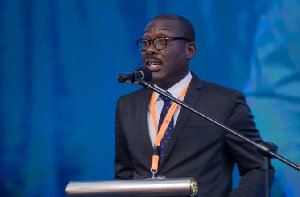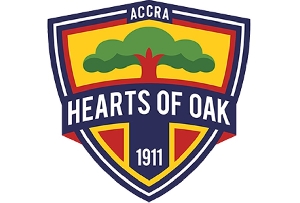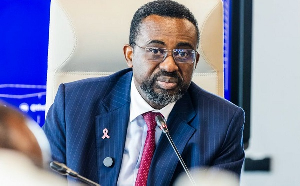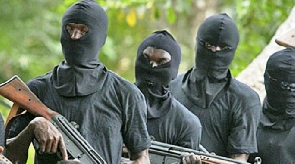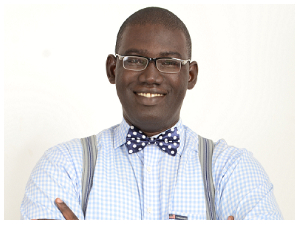- Part Three (Final)
By Kwame Okoampa-Ahoofe, Jr., Ph.D.
I had wanted to make this write-up a two-part rejoinder, but there are a few remaining issues raised by Mr. Peter Mawunyo Dzidza that need answering or they may erroneously be deemd gospel truths when, in reality, these are nothing short of the desultory rumblings and fabrications of a clinically paranoid anti-Akan bigot. In his article titled "Professor Mike Ocquaye Worsens The NPP's Plight" (Modernghana.com 4/16/14), the author claims that Akans may be extremely resentful of Ewes and Northerners because these two groups have traditionally dominated the Ghana Civil Service by dint of diligence and comparatively better academic and professional training.
I have heard the same argument made by anti-Akan Ewe writers and critics over and over again. Now, I don't know who originally put such nonsense into the public domain; and were that mischief maker certain of this patently unproven, feel-good and self-preening poppycock, s/he would also have provided statistical evidence to back his/her claim. There is no gainsaying, indeed, that a remarkable percentage of coastal Ewes, or Anlo-Ewes (if the dear reader prefers the latter designation) have been in contact with modern Western education for quite sometime now; but so has a remarkable percentage of the members of such Akan sub-ethnic polities as the Fante, Ahanta, Effutu, Akuapem and Akyem.
For instance, the oldest higher educational institution in the erstwhile Gold Coast prior to the establishment of the University of Ghana (formerly University College of the Gold Coast), the country's flagship academy, was the Presbyterian Teacher-Training College (PTC), located at Akuapem-Akropong. Almost every Ewe intellectual and/or scholar of remarkable repute received his/her higher education at PTC in the period prior to 1950. Other adjuncts to the latter institution of fairly equally remarkable repute in the period under consideration were the Methodist Teacher-Training College at Elmina and the Achimota School (formerly the Prince of Wales School).
The founding of Akropong PTC, Achimota School and the University of Ghana were all championed by Akans of Akyem-Akuapem descent. Dr. J. E. K. Aggrey, of the Saltpond-Anomabu littoral, is a Fante descendant of Akyem stock; most knowledgeable citizens of Saltpond are well aware of this fact. Dr. Aggrey's fast friendship with the Okyenhene, Osagyefo Nana Sir Ofori-Atta I, the man who convened the Gold Coast National Conference at which the establishment of Achimota was discussed, was thus not an act of sheer happenstance. I hyphenate Akyem and Akuapem because the traditional royal capital of the Akuapem State was founded by Akyem-Abuakwa's Asona royal paramountcy circa. 1700, as a formidable citadel of Guan defense against "foreign" invaders like the Krobo, Akwamu and, yes, the Ewe.
But what is relevant and significant to point out here is the fact that the overwhelming majority of the graduates of the institutions listed above were Akan and then Ga, and not Ewe, although a remarkable number of the latter group was also trained in these institutions. What I am driving at here is that if the overwhelming majority of employees of the country's civil service were, indeed, other than Akan-descended citizens, the reason or reasons for such apparent underrepresentation had far little to do with a woeful lack of adequate academic and/or professional training, as Mr. Dzidza would have his readers believe.
Very likely, it has to do with the fact that Akans are relatively far more materially endowed, by dint of our own entrepreneurial genius, than both the Ewes and Northerners combined and have little need to work for the government. It was, indeed, the "Lootocratic" and "Kleptocratic" advent of the Nkrumah-led Convention People's Party (CPP) that brought a critical mass of Ewes and Northerners, of all ethnic affiliations, into the civil service. Recently, for example, an Akan-named Ewe writer - far older than yours truly but his junior in doctoral studies at a globally renowned Philadelphia, Pennsylvania, university and his grossly misguided Akan-descended (at least that is what the young urchin claims) graduate student of the same institution, one young enough to be his much older Akan-named associate's own son, decided to collaborate in composing and publishing a series of heretical and largely incoherent cut-and-paste articles supposedly aimed at definitively and permanently erasing the formidable, immense and indelible legacy of the putative Doyen of Gold Coast and Ghanaian Politics.
Well, this is not the first time that some fanatical and ardent Nkrumacrats have embarked on such a quixotic and decidedly lunatic venture. And this, too, of course, is bound to miserably fail. In fact, their project can be aptly described as stillborn. Danquah's everlasting legacy has already been comprehensively documented by unimpeachable scholars like Prof. L. H. Ofosu-Appiah to be threatened by a crop of intellectual quadraplegics and toddlers.
In his landmark classic, The Life And Times of J. B. Danquah, for example, Prof. Ofosu-Appiah documents most of Danquah's phenomenal achievements, including the latter's yeomanly struggle for the establishment of the University of Ghana, the Ghana Cocoa-Marketing Board (now Cocobod) in 1947, by the way, and not 1951, as some Nkrumah propaganda scam-artists would have their readers believe; the now-Ghana National Football League and even the very idea and initiative behind the establishment of the Tetteh-Quarshie Memorial Hospital, located at Akuapem-Mampong, and the Ghana Academy of Arts and Sciences, of which Dr. Danquah was also a founding member.
I do not intend to dissertate on the incomparable scholastic and intellectual stature of Dr. Danquah among the members of his generation and contemporaries. I have already done so in my modest political biography of this behemoth of Ghanaian culture and letters titled Dr. J. B. Danquah: Architect of Modern Ghana (2005). The latter publication, the first of its kind on the Doyen of Modern Ghanaian Politics in nearly 40 years, has already been recognized by the Ghana Academy of Arts and Sciences as a significant contribution to Danquah scholarship.
Anyway, the stark conflict-of-interest that was the infamous Sallah Case, as raised in his article by Mr. Peter Mawunyo Dzidza, has also been amply dealt with by more competent scholars and writers on the subject. And the comprehensive details of that cause celebre are readily accessible via "Google.com." Suffice it, however, for me to conclude herein that Sallah had absolutely nothing to do with Busia's purported anti-Ewe sentiments. Rather, it had everything to do with partisan politics and the constitutional rule of law. Whatever aspect(s) of the case that may appear to verge on the ethnocentric is purely incidental.
Ultimately, there is a diddly little that I can do to remedy the seemingly intractable, or rather incurable, canker called the EWE SIEGE MENTALITY. But at least, I can forcefully facilitate the prompt and definitive countering of such viciously gratuitous and unprovoked attempt to mischievously burden the rest of us well-meaning and forward-looking, and progressive-thinking, Ghanaians with such largely self-concocted poisonous mentality aimed at undermining our cross-ethnic harmony and national cohesion. I hope I have achieved a little of bit of the same.
________________________________________________________________
*Kwame Okoampa-Ahoofe, Jr., Ph.D.
Department of English
Nassau Community College of SUNY
Garden City, New York
April 17, 2014
E-mail: okoampaahoofe@optimum.net
###
Opinions of Sunday, 20 April 2014
Columnist: Okoampa-Ahoofe, Kwame


